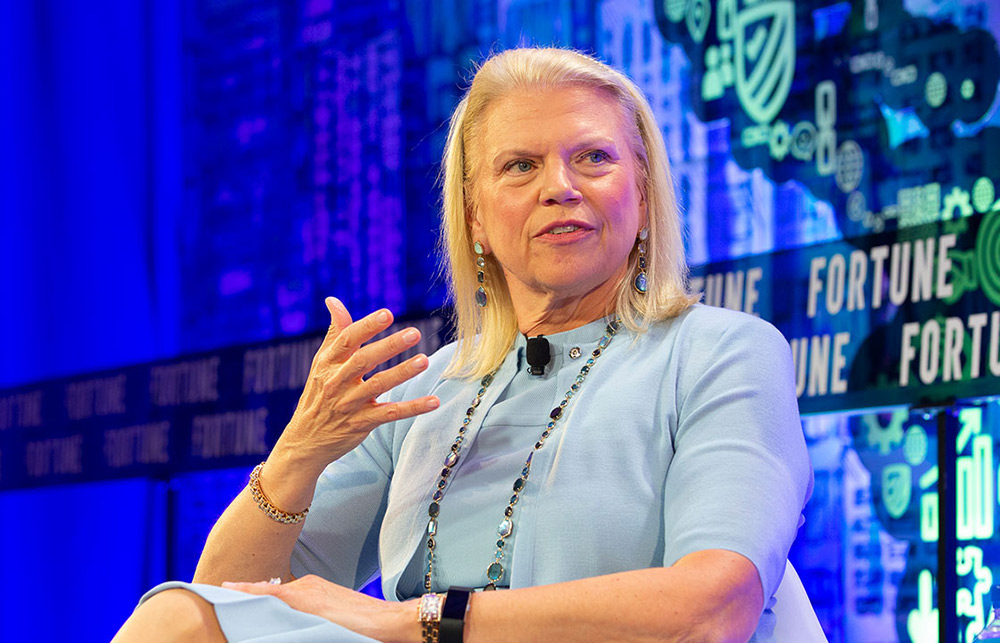
雖然羅睿蘭不再是IBM的首席執行官,但她繼續留在公司擔任董事會執行主席。現在,她計劃要改變公司甚至商界雇傭員工的方式。
“我們不能等下一代再來解決這個問題。”羅睿蘭說道。她認為在許多公司,黑人與棕色人種高管的任職人數不足。(今年《財富》美國500強榜單上只有5位黑人男性CEO。)
6月18日,這位曾在IBM工作近40年的前首席執行官,在《財富》最具影響力的商界女性的活動上談到了反種族主義、重新裁員以及對未來職場的看法。
“我們從多元性到包容、平等,再到種族不公平,”羅睿蘭表示。“我們的方式和關注點都有問題。無論做什么(推動勞動力多元化),我們都沒有完全理解需要如何做出改變。”
羅睿蘭分享了一些關于如何做出真正改變的建議。首先,她建議領導者組織一些專門傾聽黑人員工想法的會議,這也是IBM迄今為止對2500名員工做過的事情。
羅睿蘭說:“每位(黑人)員工都可以談論被騷擾或歧視的事情。如果你和你的員工一起經歷過這些,你將做出改變。”
羅睿蘭和許多商界領袖一樣,喜歡把想法和計劃分成三部分。她提出改變雇傭方式,第一步是審視特定工作職位對員工的要求,并根據優先級,對員工需要具備的技能排序。這種招聘方式不再強調具體的大學要求,而是專注于“技能優先”。第二步是給出清晰的進入公司的路徑,而不僅僅是傳統的方式,如學徒制。最后,她還鼓勵領導者培養公私伙伴關系。
出席此次活動的羅德島州州長吉娜?雷蒙多補充道,公司和政府部門的相關人士都沒有足夠齊心協力。
“作為領導人,我們如何以兩黨合作的方式,利用疫情危機與種族不平等這一時期,采取大規模行動讓公司真正改變雇傭方式,讓各州和聯邦政府真正改變培訓方式?”州長向羅睿蘭和其他聽眾問道。
羅睿蘭表示,盡管她不再是IBM的首席執行官,但她仍然致力于帶來改變,并計劃堅持不懈地呼吁企業與政府部門采取更多措施來改變以往培訓、招聘和留住人才的方式。
“我們必須為身邊人創造更多的機會,”羅睿蘭說道。“從家里開始。”(財富中文網)
編譯:于佳鑫
雖然羅睿蘭不再是IBM的首席執行官,但她繼續留在公司擔任董事會執行主席。現在,她計劃要改變公司甚至商界雇傭員工的方式。
“我們不能等下一代再來解決這個問題。”羅睿蘭說道。她認為在許多公司,黑人與棕色人種高管的任職人數不足。(今年《財富》美國500強榜單上只有5位黑人男性CEO。)
6月18日,這位曾在IBM工作近40年的前首席執行官,在《財富》最具影響力的商界女性的活動上談到了反種族主義、重新裁員以及對未來職場的看法。
“我們從多元性到包容、平等,再到種族不公平,”羅睿蘭表示。“我們的方式和關注點都有問題。無論做什么(推動勞動力多元化),我們都沒有完全理解需要如何做出改變。”
羅睿蘭分享了一些關于如何做出真正改變的建議。首先,她建議領導者組織一些專門傾聽黑人員工想法的會議,這也是IBM迄今為止對2500名員工做過的事情。
羅睿蘭說:“每位(黑人)員工都可以談論被騷擾或歧視的事情。如果你和你的員工一起經歷過這些,你將做出改變。”
羅睿蘭和許多商界領袖一樣,喜歡把想法和計劃分成三部分。她提出改變雇傭方式,第一步是審視特定工作職位對員工的要求,并根據優先級,對員工需要具備的技能排序。這種招聘方式不再強調具體的大學要求,而是專注于“技能優先”。第二步是給出清晰的進入公司的路徑,而不僅僅是傳統的方式,如學徒制。最后,她還鼓勵領導者培養公私伙伴關系。
出席此次活動的羅德島州州長吉娜?雷蒙多補充道,公司和政府部門的相關人士都沒有足夠齊心協力。
“作為領導人,我們如何以兩黨合作的方式,利用疫情危機與種族不平等這一時期,采取大規模行動讓公司真正改變雇傭方式,讓各州和聯邦政府真正改變培訓方式?”州長向羅睿蘭和其他聽眾問道。
羅睿蘭表示,盡管她不再是IBM的首席執行官,但她仍然致力于帶來改變,并計劃堅持不懈地呼吁企業與政府部門采取更多措施來改變以往培訓、招聘和留住人才的方式。
“我們必須為身邊人創造更多的機會,”羅睿蘭說道。“從家里開始。”(財富中文網)
編譯:于佳鑫
Ginni Rometty is no longer the CEO at IBM. But the current executive chairman of the tech giant has big plans for transforming the way the company—and the business world more broadly—goes about hiring employees.
“We can’t wait a generation to fix this,” said Rometty, referring to the underrepresentation of black and brown executives in many companies, particularly in the highest ranks. (There are only five black CEOs, all of whom are male, on this year’s Fortune 500 list).
The former CEO, who spent nearly 40 years at IBM, spoke about anti-racism, reskilling workers, and the workplace of the future during a Fortune Most Powerful Women virtual event on June 18. She was surprisingly candid about the failures of many corporate diversity initiatives.
“We moved from [talking about] diversity to inclusion to equality and then to racial injustice,” said Rometty. “Something is wrong with that pattern and with where our focus has been. Whatever we did [to diversify workforces], we didn’t thoroughly understand what we needed to do to change.”
Rometty shared several suggestions for how to push for real change. For starters, she recommended that leaders organize listening sessions with black employees—something IBM has done so with 2,500 people in their own workforce so far.
“They’re gut-wrenching,” said Rometty. “Every single [black] employee could talk about a moment they were harassed. Every one of them could recall a day they were called a very bad name. If you go through this experience with your employees, you will be forever changed.”
Rometty, who like many business leaders, likes to group thoughts and initiatives in threes, also had a trio of to-dos for executives who are looking to change the way they hire. The first step was to take an honest look at their job requirements and re-prioritize around the skills that are truly needed to excel at any particular position. Do away with specific college requirements and focus on a “skills-first” hiring approach. The second suggestion was to give a clear pathway into your company—and not just the traditional one. Invest in apprenticeship programs, for example. Lastly, Rometty also encouraged leaders to be pursue private-public partnerships.
Rhode Island Gov. Gina Raimondo, who attended the event (and was a speaker at another recent Most Powerful Women interview), added that there aren’t enough people acting in unison from both the corporate and government sectors.
“How do we as leaders, in a bipartisan way, finally use this moment of the COVID crisis and glaring racial inequities to act at scale and get companies to really change the way they hire, and get states and the federal government to really change the way they train?” the governor asked Rometty and others in the audience.
Rometty said that, even though she is no longer the CEO of IBM, she is committed to bring about change and plans to be persistent in her call for more collective action among corporations and the government sector to change old ways of training, hiring, and retaining employees.
“We’ve got to scale opportunity for the underserved around us,” said Rometty. “It starts at home.”






